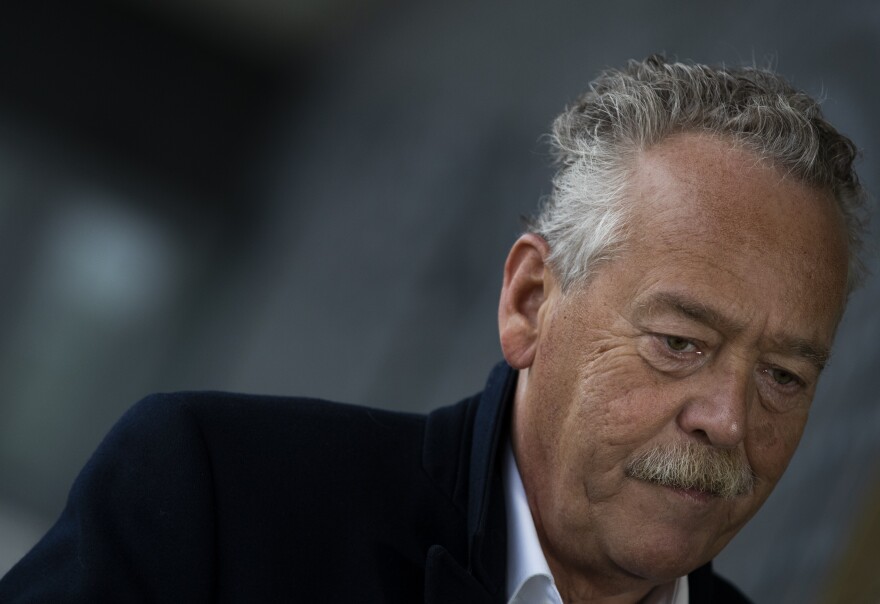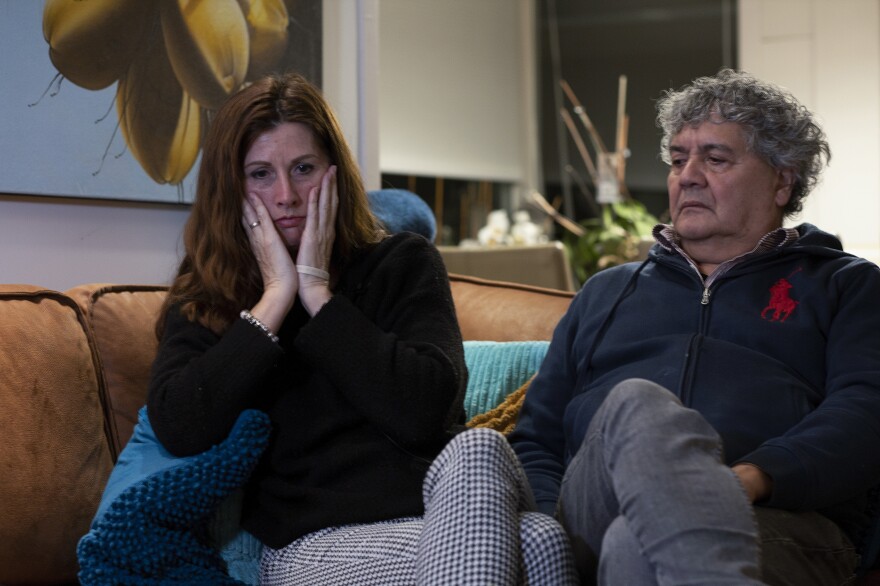KHARKIV, Ukraine — At the old candy company warehouse on Partisan Street in Izium, Ukraine, signs of the Russian occupation were everywhere. An artillery round sat near one of the walls. All around, the remains of houses lay in rubble, with caved-in walls and no roofs.
Local resident Oleksiy Zadniprovskiy greeted us there, along with a chained-up guard dog. After the Russian troops left, he and his team of humanitarian workers moved in to help the recently liberated area recover.
Zadniprovskiy introduced us to Ruslan, a volunteer who declined to give his last name because he feared danger if the Russians return. Even now, the building is less than 100 kilometers from Bakhmut, the flashpoint for ongoing fighting in eastern Ukraine.
Ruslan told us what we'd come there to learn: that he heard and saw anti-aircraft missiles being fired from the vicinity of the complex while the area was under Russian occupation.
The old warehouse, adorned with banners of Western beers like Budweiser and Corona Extra, had been the temporary headquarters of a Russian anti-aircraft unit. Prosecutors in the Kharkiv region of Ukraine confirmed that. They showed us a document confiscated after the Russian retreat that named the unit's commander, including his phone number and call sign — "Вoлда́й," — along with the address for their headquarters.
The sources and documentation also confirmed it wasn't just any anti-aircraft unit.
It was the 53rd Anti-Aircraft Missile Brigade, among the most notorious — and wanted — units in the Russian military.
The 53rd is best known for its role in shooting down Malaysia Airlines Flight MH17 in 2014 as it flew over Ukraine en route from Amsterdam to Kuala Lumpur. All 298 passengers and crew died.
"You can regard the downing of Flight MH17 [as the] Dutch 9/11," said Brechtje van de Moosdijk, a spokesperson for the Joint Investigation Team exploring the civilian airline attack. "When it happened, it was a hot summer's day, July 17, 2014. Everybody was happy and on holidays or lying in the garden or at the swimming pool. And then this plane was downed."
And the 53rd has been an international pariah ever since, at least as much as war crimes investigators are concerned. The fact that the unit is operating in Ukraine still today? It's like the Russian president taunting the rest of the world.
"This unit, after it shot down Malaysia Airlines Flight 17... did not face any retribution. They did not face any justice for the crimes they committed," said George Barros, a Russia analyst at the Institute for the Study of War. "And unfortunately, this is very much systematic in the way that the Russian Federation has been able to violate international law."
On the trail of the 53rd Brigade
Ukrainian military and intelligence sources told NPR that the 53rd Brigade was active over much of 2022 in the Kharkiv region, an area in the northeast of Ukraine near the Russian border.
But there was little concrete evidence of the unit's specific location. The 53rd Brigade specializes in anti-aircraft missile systems. Unlike infantry or mechanized units, they do not fight on the front lines, where open-source photos of captured prisoners of war can be used to provide information about a unit's activities and whereabouts.

"Militaries undertake significant efforts to try to hide their important key battlefield assets," explained Barros. "The 53rd is certainly one of those because it's designed to protect the front-line units from air attacks."
Ukraine retook control of the Kharkiv region in September of last year. During that period of fighting, Ukrainian forces retrieved some documents Russian forces left behind at an abandoned headquarters in the Kharkiv region.
One of the documents listed the military units that Russian forces had in the Izium area. On the 17th line, there was information about the 53rd that we had been looking for.
"I can confirm that we have information that for some time they were settled in the Izium district, in the Kharkiv region," Oleksandr Philchakov, the lead prosecutor for the Kharkiv region, told NPR. Philchakov was tracking various Russian units as part of his office's efforts to prosecute alleged war crimes.

Barros reviewed the document and found it looked authentic. He also pointed out that the information matches other open-source information about where the 53rd's affiliated units were.
The confirmation that the brigade had been fighting in Izium could be important to Ukrainian and Western prosecutors looking to find justice for possible war crimes, not to mention the families of the victims of MH17.
A notorious history
The connection between the 53rd Brigade and Malaysia Airlines Flight 17 was first made by open-source investigators at Bellingcat.
Separately, a Joint Investigation Team made up of multiple countries that lost citizens due to the downing of MH17 concluded after years of work that a missile system supplied by the 53rd Brigade was behind the crash.
Last month at The Hague, the Joint Investigation Team announced some final findings and offered stunning new details. The investigators played intercepted phone calls of Russian-backed separatists that were fighting in eastern Ukraine in 2014.

Using these calls, investigators concluded that Russian President Vladimir Putin himself was ultimately behind the transfer of an anti-aircraft system — the same system that eventually shot down Flight MH17. It underscored that the 53rd Brigade's fatal actions were at Putin's direction.
Russian-backed separatists in the area after the plane crashed didn't appear to show regret for the incident, according to Russian military expert Tom Bullock.
"There are multiple photos found on their social media accounts showing them posing next to debris from the aircraft, standing next to the Malaysia Airlines logo and posing for photos for their social media," Bullock said.
The unit's painful legacy
Piet Ploeg lost his brother, his brother's wife and their son on the plane. His brother's remains were never identified.
"I always say our family members were, in fact, the first non-Ukrainian victims of a war that started eight years ago," he said. "So everything [that] gives us information about the role of Russia in Ukraine is, for us, important because it helps us to form ... world opinion about the role of Russia in Ukraine."

The confirmation of the 53rd's recent activities is also important for people like Silene Fredriksz, whose son was killed in the downing of MH17.
"Our lives changed completely. We had a family with five children, and now they're only four," she said. "And nothing, and nobody, can fill in the gaps that they left. It hits you in every aspect of your life. I'm not the same person as I was before. It's a life before and a life after. And it's very hard. Still very hard."
She's paid special attention to the 53rd and is still haunted by the unit's deadly decisions. Information about the unit and the Russian military's actions help her process her grief.

"[I] watch everything that has anything to do with the war now going on and everything that has to do with MH17, Russia, Ukraine," she said. "I will never have closure. ... But when we get to know part of the truth, [it] gives us rest."
Shortly before the publication of this story, President Vladimir Putin signed a new decree about the 53rd Brigade.
Apparently unconcerned about how it would look to the outside world, he ordered that the unit be given a new honorary designation: the title of "Guards," a term reserved for supposedly elite Russian units.
Copyright 2023 NPR. To see more, visit https://www.npr.org.


